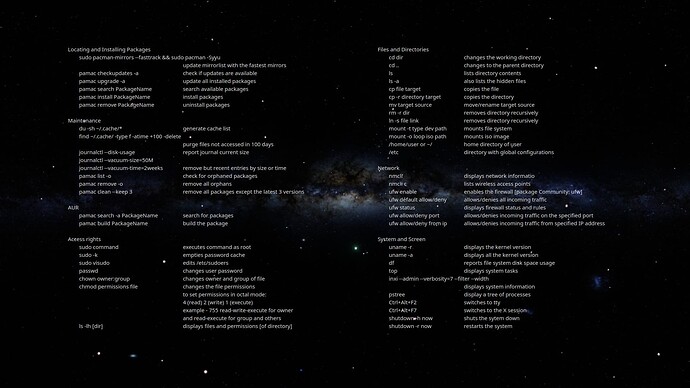I just didnt liked the ones that showed up in google (updated, with suggestions)
Nice. 
Nice work.
What about transfering this to a wiki?
If you create this as a text(-wiki) post here, anyone can access the commands directly (copy and paste), and it can be extended (if as wiki-post).
System and Screen
Display the Kernel-version
uname -r
Or if you agree, I can create it in the manjaro-wiki. (It is more beautiful there than here)
thx, ok, a wiki post sounds great,
Locating and Installing Packages
sudo pacman-mirrors --fasttrack && sudo pacman -Syyu
update mirrorlist with the fastest mirrors
pamac checkupdates -a check if updates are available
pamac upgrade -a update all installed packages
pamac search PackageName search available packages
pamac install PackageName install packages
pamac remove PackageName uninstall packages
Maintenance
du -sh ~/.cache/* generate cache list
find ~/.cache/ -type f -atime +100 -delete
purge files not accessed in 100 days
journalctl --disk-usage report journal current size
journalctl --vacuum-size=50M
journalctl --vacuum-time=2weeks
remove but recent entries by size or time
pamac list -o check for orphaned packages
pamac remove -o remove all orphans
pamac clean --keep 3 remove all packages except the latest 3 versions
AUR
pamac search -a PackageName
search for packages
pamac build PackageName build the package
Access rights
sudo command executes command as root
sudo -k empties password cache
sudo visudo edits /etc/sudoers
passwd changes user password
chown owner:group changes owner and group of file
chmod permissions file changes the file permissions
to set permissions in octal mode:
4 (read) 2 (write) 1 (execute)
example - 755 read-write-execute for owner
amd read-execute for group and others
ls -lh [dir] displays files and permissions [of directory]
Files and Directories
cd dir changes the working directory
cd .. changes to the parent directory
ls lists directory contents
ls -a also lists the hidden files
cp target file copies the file
cp -r target directory copies the directory
mv target source move/rename target source
rm -r dir removes directory recursively
ln -s file link removes directory recursively
mount -t type dev path mounts file system
mount -o loop iso path mounts iso image
/home/user or ~/ home directory of user
/etc directory with global configurations
Network
nmcli displays network informatio
nmcli c lists wireless access points
ufw enable enables the firewall [package Community: ufw]
ufw default allow/deny allows/denies all incoming traffic
ufw status displays firewall status and rules
ufw allow/deny port allows/denies incoming traffic on the specified port
ufw allow/deny from ip allows/denies incoming traffic from specified IP address
System and Screen
uname -r displays the kernel version
uname -a displays all the kernel version
df reports file system disk space usage
top displays system tasks
inxi --admin --verbosity=7 --filter --width
displays system information
pstree display a tree of processes
Ctrl+Alt+F2 switches to tty
Ctrl+Alt+F7 switches to the X session
shutdown -h now shuts the sytem down
shutdown -r now restarts the system
Find
find <startingdirectory> <options> <search term>
Basic structure
find -name "file” Find by name
find -iname "file” Find by name, ignoring CL
find -name “*.format” Find by format
find -not -name "file" Exclude a name
find -type "type" f:file, d:directory, l:link...
find -empty Empty files and directory
find -exec Find executable programs
and force refresh the packages databases (required when changing mirror), and update the system
AUR included
typo, one o added
typo, not sure what you meant there
could maybe note that it is the same as the ~/ folder (for current user)
could be confusing for people with literally a Fn key (laptops usually)
Hello @guillopacheco ‘ifconfig’ is not installed per default on manjaro. But ‘nmcli’ should be available for everyone. ![]()
post updated, @andreas85 wiki - CheatSheet - Manjaro
Good as info, impossible to use as desktop wallpaper (for me) cause desktop icons presence and represents recent and constant working files/folders on the Desktop.
Could be useful for users who have no working files/folders on their Desktop and have to access them in more complicated way instead of instant and having list of them constantly immediately.
PS
Could be useful for those who have 2 monitors setup to show on second screen with no desktop icons on it.
maybe using virtual desktops, or activities can help you with that situation, we are free now in manjaro linux.
I agree with alven. It is the same reason why i don’t like and use conky. Putting up this in the wiki is a really nice idea 
I actually have the cheatsheet as sticky notes, so i can change the wallpaper, or leave it random, theres the image, the text, the wiki… all covered
At copy and move operations source and target are in the wrong order:
cp [file] [target]
missing:
create symbolic link {{UserCmd|command=ln -s [target] [link]}}
outdated with systemd:
starts a daemon {{UserCmd|command=rc.d start [daemon]}}
stops a daemon {{UserCmd|command=rc.d stop [daemon]}}
restarts a daemon {{UserCmd|command=rc.d restart daemon}}
done
Install SSL Cert in system from a file
wget foobar.com/foobar.crt && sudo cp foobar.crt /etc/ca-certificates/trust-source/anchors/ && sudo trust extract-compat
KDE Connect ports
sudo ufw allow 1714:1764/tcp
sudo ufw allow 1714:1764/udp
Others stuffs
sudo parted -l
sudo blkid
findmnt -s
efibootmgr -v
nmcli
nmcli dev show
nmcli device wifi list
udisksctl loop-setup -f UDF-ISO-FILENAME.iso
udisksctl mount -b /dev/loop0
sudo fdisk -l
sudo e2label /dev/sdb1 "mydiskname"
inxi -Fxxxza --no-host
journalctl --this-boot --no-pager --no-hostname
systemd-analyze blame --no-pager
# https://stackoverflow.com/questions/23645595/how-to-find-linux-module-path
awk '{ print $1 }' /proc/modules | xargs modinfo -n | sort
###
rfkill list
sudo lspci -k
sudo lspci -vnnn | perl -lne 'print if /^\d+\:.+(\[\S+\:\S+\])/' | grep Control
sudo lspci -vnnn | perl -lne 'print if /^\d+\:.+(\[\S+\:\S+\])/' | grep 3D
grep -R . /sys/foo/bar
fixed. thx!
